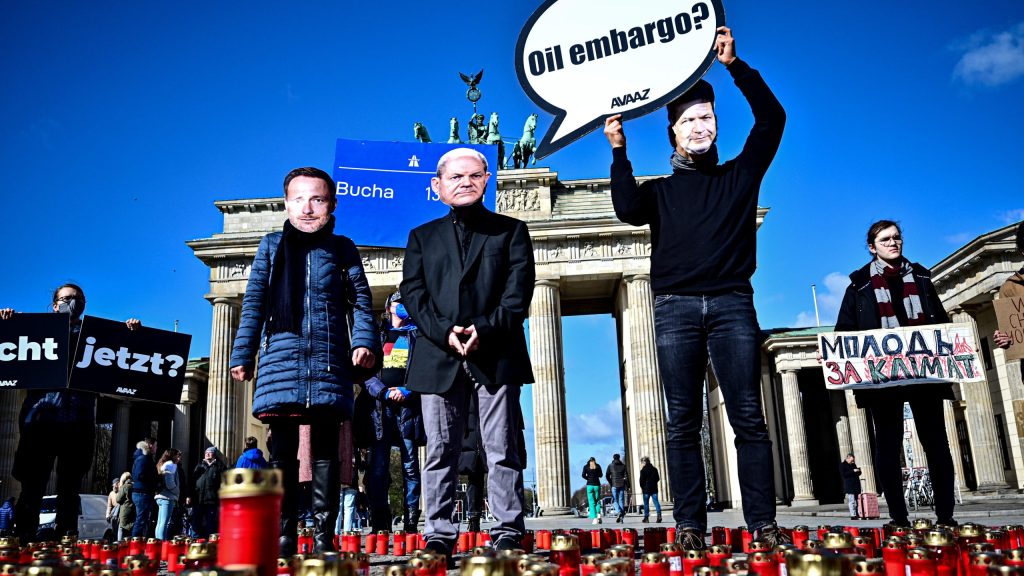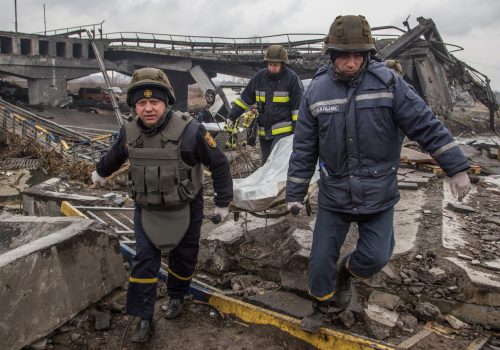For years, climate activists have called for a war-like mobilization to drive a rapid transition to clean energy. Today, these demands have taken on a new urgency: Russia’s invasion of Ukraine has been a relentless demonstration of just how much fossil fuels threaten the world’s shared security.
The brutality of Russia’s military, the Kremlin’s leverage over NATO, and the resulting global impact of the crisis have, to a large extent, all been made possible by the fossil fuels powering Russian President Vladimir Putin’s war. Most recently, Josep Borrell, the European Union’s (EU’s) foreign policy chief, pointed out that while the EU has sent one billion dollars in aid to Ukraine, it spends roughly that same amount each day on fossil fuel imports from Russia.
Just days after the invasion began, the connection between Russia’s fossil-fueled aggression and the climate crisis was underscored by the experience of Ukraine’s delegates to the United Nations Intergovernmental Panel on Climate Change—who had to break from finalizing a report to shelter from bombs. “Climate change and the war on Ukraine have,” said Ukrainian climate scientist Svitlana Krakovska, a member of the delegation, “the same roots: fossil fuels, and our dependence on them.”
The transatlantic reliance on fossil fuels can—and must—be broken.
For their part, the United States, United Kingdom, and EU are united in recognizing the need to wean themselves off Russian oil and gas. Their strategies have three broad components: phase out or ban imports from Russia and make up the shortfall from (expensive) non-Russian sources; reduce energy use through increasing insulation and other efficiency measures; and rapidly increase clean-energy investments to replace fossil fuels entirely.
But this course faces big political hurdles, especially because it will take time to rally a crash mobilization of clean energy and insulation. So fossil fuels will bridge the gap: Europe will import more gas from the United States to make up for the Russian shortfall, and coal power plants slated for decommissioning may see their lifespan extended.
For one, this provides Western oil and gas majors with an opportunity to leverage their position, acting as energy saviors in the short-term, while seeking to water down the longer-term green transition. These firms have always excelled at influencing political agendas, exercising their vast lobbying power to slow the shift toward clean energy. Recent years have seen the political tide turn against them, but Russia’s war may open up fresh opportunities for fossil CEOs.
Meanwhile, living standards are nosediving because of rising fuel prices, with households already hurting from the knock-on effects of the COVID-19 pandemic. A group I would call “fossil populists” are exploiting this opportunity: These are influential politicians who rose to prominence in the culture wars of the past decade and are using their anti-elite playbook to call for a fossil-fueled solution to the energy crisis.
In the United Kingdom, for example, the leading pro-Brexit politician (and now broadcaster) Nigel Farage is recasting himself in this mold, using high gas prices to call for a reboot of Britain’s moribund fracking industry and campaigning for a referendum on the government’s climate target of net-zero emissions by 2050. Neither of these demands makes economic, political, or environmental sense—but in a time of hardship for millions, the Brexit-inspired language of suffering people versus out-of-touch elites is as familiar as it could be persuasive.
Smart politics—and policymaking
These threats can be neutralized by putting households first. Just as many European countries offered emergency support to families during the pandemic, future investments in insulation and clean energy should target households on the frontline of the squeeze. The energy war can be won by giving people warm homes, cheap bills, and security of supply.
Environmentalist Bill McKibben’s idea of “heat pumps for peace and freedom” is an example of how this can be done. Harking back to the Lend-Lease arrangements of World War II, the US government could provide guaranteed federal contracts for heat pump manufacturers in the United States to rapidly increase production and provide these at, or below, cost to European nations.
The International Energy Agency estimates that rolling out heat pumps could cut Europe’s reliance on Russia gas by two billion cubic meters (bcm) in just one year, all while building longer term energy security. Since European manufacturers have limited capacity to meet a massive increase in supply, the shortfall could be made up by US manufacturers: President Joe Biden could bypass Congress and use the Defense Production Act to provide loans and purchasing guarantees to heat-pump producers (much like his predecessor did when mandating ventilator production in response to COVID-19).
This would be smart politics, reflecting the abrupt convergence of shared agendas across the Atlantic: the geopolitical necessity to stand up to Putin, the geoeconomic effort to slow his war machine, and the environmental imperative to reduce emissions. It would also provide clear gains to households, attenuating the siren call of fossil populism. No wonder the White House is reportedly interested.
Even more so, it would be smart policymaking. Targeted investment and acceleration in production can help trigger “tipping points,” an abrupt change in the price of technologies and their maturity in markets. For example, Norway has used its tax system to make electric vehicles cheaper than petrol alternatives, leading to electrics surging to become a majority of new car sales in 2020.
Tipping points can also be intentionally triggered to phase out unwanted technologies. In the 2010s, for instance, the British government helped increase the cost of energy production from coal, pushing it above the price of using gas, which—along with the falling price of renewables—eventually made coal plants unprofitable. As a result, coal use collapsed 75 percent in five years.
So far, tipping points have largely been identified and triggered by individual countries. But a transatlantic plan to rapidly roll out heat pumps could accelerate tipping points: reductions in the price of heat pumps, their widespread rollout, and a collapse in the use of gas boilers.
This principle can be applied to a raft of other technologies where the US has a lead over Europe in development and production, particularly grid-scale batteries.
The benefits wouldn’t stop there. A surge in the production and installation of clean technology would bring millions of high-quality jobs in the United States and Europe. Meanwhile, reductions in the cost of clean technologies would spill over into international markets, helping other countries gain access to cheaper alternatives to fossil fuels. This is a pressing need for lower income nations that are on the frontline of the climate crisis and need support to ditch fossil fuels.
The events of the past two months, as well as the growing threat of the climate crisis, are tragic proof of the necessity to aggressively decarbonize. The transatlantic community should seize on this historic opportunity for a definitive shift to a safer, more secure future.
Laurie Laybourn is a visiting fellow at Chatham House and leads the Cohort 2040 project, which explores how emerging leaders can be prepared for a future of deepening environmental crisis. Follow him on Twitter @Laurie_L_L.
Further reading
Fri, Apr 1, 2022
In Ukraine, I’ve seen the impossible become possible. The West hasn’t grasped that yet.
New Atlanticist By Dan Peleschuk
Atlantic Council editor Dan Peleschuk reflects on what it's like watching stark realities unfold—and why policymakers should act now.
Mon, Apr 4, 2022
Can crypto deliver aid amid war? Ukraine holds the answer.
New Atlanticist By Ananya Kumar, Nikhil Raghuveera
Ukraine’s current experience could transform how aid is disbursed across the world.
Wed, Apr 6, 2022
Zelenskyy wants Ukraine to be ‘a big Israel.’ Here’s a road map.
New Atlanticist By Daniel B. Shapiro
By adapting their mindset to mirror aspects of Israel’s approach to security challenges, Ukrainian officials can tackle their own critical challenges with confidence.
Image: Activists wearing masks with the likenesses of German officials demonstrate against European dependence on Russian energy at the Brandenburg Gate in Berlin on April 8, 2022. Photo by Fabian Sommer/dpa/REUTERS



